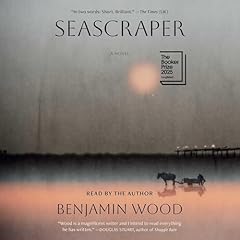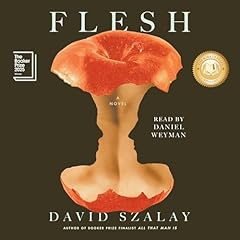
The Unbroken Coast
A Novel
No se pudo agregar al carrito
Solo puedes tener X títulos en el carrito para realizar el pago.
Add to Cart failed.
Por favor prueba de nuevo más tarde
Error al Agregar a Lista de Deseos.
Por favor prueba de nuevo más tarde
Error al eliminar de la lista de deseos.
Por favor prueba de nuevo más tarde
Error al añadir a tu biblioteca
Por favor intenta de nuevo
Error al seguir el podcast
Intenta nuevamente
Error al dejar de seguir el podcast
Intenta nuevamente
Prueba gratis de 30 días de Audible Standard
Selecciona 1 audiolibro al mes de nuestra colección completa de más de 1 millón de títulos.
Es tuyo mientras seas miembro.
Obtén acceso ilimitado a los podcasts con mayor demanda.
Plan Standard se renueva automáticamente por $8.99 al mes después de 30 días. Cancela en cualquier momento.
Compra ahora por $25.20
-
Narrado por:
-
Sneha Mathan
-
De:
-
Nalini Jones
On the night his granddaughter is born in America, Professor Francis Almeida rides a bicycle through his quiet Catholic neighborhood in a suburb of Mumbai. It is 1978. He has recently retired, his grown children are scattered across the globe, and for the first time in decades, he is not sure what he should do next. A few streets from his home, in the heart of a Koli fishing village, he encounters a young mother praying for her baby daughter, ill with dengue fever, at the shrine of Our Lady of Navigators. He hopes the child will live.
Nearly a decade later, Francis meets the child again. She is Celia, daughter of a fisherman who is running from a debt collector. When an accident brings their families together, both Celia and Francis find themselves with unexpected new allies.
Spanning the turbulent years when Bombay became Mumbai, at time when environmental and economic pressures are just beginning to change the fortunes of indigenous fisherfolk, The Unbroken Coast is a lyrical novel that explores memory, faith, storytelling, and the nature of home.
Los oyentes también disfrutaron:












Reseñas de la Crítica
“What a beautifully formed novel. With its changing portraits of two families in a Catholic fishing village outside Mumbai, The Unbroken Coast does what the best fiction does—it is utterly particular and utterly large. And I could not put it down.”
—Joan Silber, author of Improvement and Mercy
“The Unbroken Coast is a beguiling epic about a Catholic community in Mumbai grappling with the treacheries of progress and the inexorable march of time. Illness devastates the novel’s humble, endearing protagonist, who bravely crosses class boundaries in her enthralling search for peace. Readers will find a home in Jones’s razor-sharp portraits of family life.”
—Hirsh Sawhney, author of South Haven
“Jones’ novel opens with the recovery of a sunken statue off the Bombay coast in 1640. Representing Stella Maris, the Virgin Mary as celestial queen, it stands at the center of a small Catholic community, a legacy of the Portuguese. Jones moves swiftly into the modern era, beginning in the late 1970s with a distracted historian emeritus, Francis Almeida, now sagging into an unfulfilling retirement, lost in his archives while missing his children and grandchildren, who are scattered around the globe. Well into the narrative, as Jones carefully rounds out her characters, Almeida runs his bicycle into an 8-year-old girl, Celia D’Mello. Celia suffers a broken arm, but that’s less painful than the loss of one of the two shoes she has. Swept under the wing of the distracted professor and his loving wife, Celia becomes a familiar in the comfortable Almeida home, a sharp contrast to that of her impoverished but aspirational family. Time passes, and with it come changes: Celia grows up, marries, and suffers a string of calamities, one foreshadowed at the very start of the book. Meanwhile, Almeida suffers, a bit more each day, from dementia, vaguely recalling at first that Celia “was the village child who had once pitched into his bicycle—he could never remember the girl’s name,” eventually forgetting the names of his family. Jones writes with extraordinary empathy for her characters and their unhappy fates, peppering her prose with sharply observed aphorisms: “This was what the world did: press in on you with its bad-news this and so-sad that, snatch away what little time you had to see to your own affairs, fill your head with pictures you wished you’d never seen.” That’s just so, but her characters endure as best they can, and mostly with admirable dignity. Steeped in tragedy, but beautifully, memorably, and soulfully told.” —Kirkus
"A heartwarming and lively story wrapped up in an ode to one of the world’s most vibrant cities." —Booklist
—Joan Silber, author of Improvement and Mercy
“The Unbroken Coast is a beguiling epic about a Catholic community in Mumbai grappling with the treacheries of progress and the inexorable march of time. Illness devastates the novel’s humble, endearing protagonist, who bravely crosses class boundaries in her enthralling search for peace. Readers will find a home in Jones’s razor-sharp portraits of family life.”
—Hirsh Sawhney, author of South Haven
“Jones’ novel opens with the recovery of a sunken statue off the Bombay coast in 1640. Representing Stella Maris, the Virgin Mary as celestial queen, it stands at the center of a small Catholic community, a legacy of the Portuguese. Jones moves swiftly into the modern era, beginning in the late 1970s with a distracted historian emeritus, Francis Almeida, now sagging into an unfulfilling retirement, lost in his archives while missing his children and grandchildren, who are scattered around the globe. Well into the narrative, as Jones carefully rounds out her characters, Almeida runs his bicycle into an 8-year-old girl, Celia D’Mello. Celia suffers a broken arm, but that’s less painful than the loss of one of the two shoes she has. Swept under the wing of the distracted professor and his loving wife, Celia becomes a familiar in the comfortable Almeida home, a sharp contrast to that of her impoverished but aspirational family. Time passes, and with it come changes: Celia grows up, marries, and suffers a string of calamities, one foreshadowed at the very start of the book. Meanwhile, Almeida suffers, a bit more each day, from dementia, vaguely recalling at first that Celia “was the village child who had once pitched into his bicycle—he could never remember the girl’s name,” eventually forgetting the names of his family. Jones writes with extraordinary empathy for her characters and their unhappy fates, peppering her prose with sharply observed aphorisms: “This was what the world did: press in on you with its bad-news this and so-sad that, snatch away what little time you had to see to your own affairs, fill your head with pictures you wished you’d never seen.” That’s just so, but her characters endure as best they can, and mostly with admirable dignity. Steeped in tragedy, but beautifully, memorably, and soulfully told.” —Kirkus
"A heartwarming and lively story wrapped up in an ode to one of the world’s most vibrant cities." —Booklist
Las personas que vieron esto también vieron:






Todavía no hay opiniones


